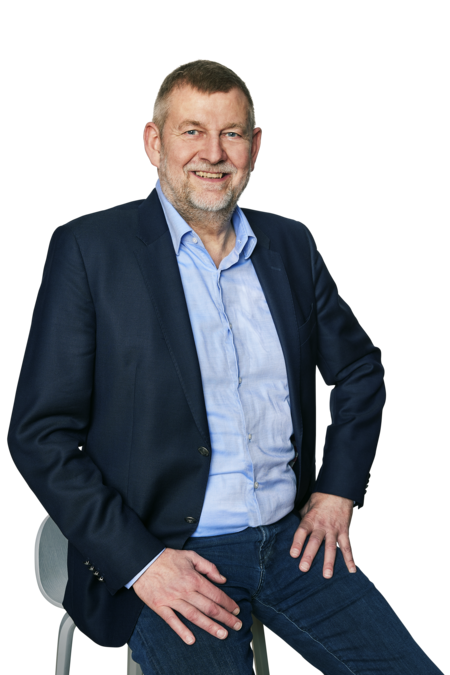Villum Synergy: data-driven interdisciplinary research accelerating

22.09.21 l Latest news
12 projects are receiving DKK 45 million in grants from VILLUM FONDEN in Denmark’s largest programme for data-driven interdisciplinary research: Villum Synergy. The projects cover a wide range of topics, including evolutionary research, efficient green energy and transparent fair asylum treatment.
“There are many research opportunities hidden in the spaces between computer science and other disciplines. We have created the Villum Synergy programme to enable researchers to utilise interdisciplinary research collaborations to make important scientific breakthroughs. This year’s 12 selected projects point to the great potential that lies in supporting excellent interdisciplinary research with data as the driver,” Thomas Bjørnholm, Executive Chief Scientific Officer, VILLUM FONDEN at VILLUM FONDEN underlines.
The programme is targeted at researchers from computer science, statistics and applied mathematics, in collaboration with researchers from a wide range of other fields – from technical and natural sciences to the humanities and social sciences.
Villum Synergy Programme
The next call for applications will be announced on 4 November 2021. The deadline for applying will be 2 March 2022.
VILLUM FONDEN received a total of 55 applications for the programme, of which six were applications for large projects in established collaborations, and 49 were for initiation projects for beginning new partnerships.
On the basis of a recommendation from the programme’s academic committee consisting of nine top researchers, VILLUM FONDEN has decided to allocate grants to one large research project and 11 pilot projects.
One of the pilot projects is XAIfair (Explainable Artificial Intelligence and Fairness in Asylum Law), a collaboration between the legal profession and researchers of machine learning. Based on data from asylum procedures, the researchers want to increase transparency and protect the legal requirement for fairness in public decision-making. The project is headed by Professor Thomas Gammeltoft-Hansen in the Faculty of Law at the University of Copenhagen, and Professor Thomas B. Moeslund from the Department of Architecture, Design, and Media Technology at Aalborg University.
“When refugees seek asylum, the authorities must make a legal decision with far-reaching consequences. But what exactly is included in such a decision, and why do seemingly identical asylum cases often turn out completely differently from country to country? The aim of our project is to develop new interdisciplinary approaches that can provide answers to these questions,” says Professor Thomas Gammeltoft-Hansen, with Professor Thomas B. Moeslund elaborating,
“We will combine methods from digital image analysis and so-called Explainable AI to create more transparency and interpretation in the analysis of asylum decisions from Denmark, Sweden and Norway.”
The Synergy grant will finance two postdocs, one based in law and the other in computer science, who will work closely together to develop common frameworks for language and understanding across the two disciplines.
VILLUM FONDEN is distributing a total of DKK 44.8 million between one large research project and 11 pilot projects:
Full project grant for established research partnership:
Professor Stefan Sommer, Department of Computer Science, University of Copenhagen &
Professor Rasmus Nielsen, GLOBE Institute, University of Copenhagen: Stochastic Morphometry: Evolutionary Modelling of Whole Shape Data, DKK 12,5 million.
Initiation projects establishing new research partnerships:
Professor Mads Græsbøll Christensen, Department of Architecture, Design and Media Technology, Aalborg University &
Professor Xiongfei Wang, AAU Energy, Aalborg Universitet: Edge AI for High Stability-Robustness of Power Electronics in Modern Power Systems, DKK 3 million.
Associate Professor Nikos Hatzakis, Department of Chemistry, University of Copenhagen &
Associate Professor Wouter Boomsma, Department of Computer Science, University of Copenhagen: Integration of protein dynamics in Deep Generative models for accelerating protein design (Deep design), DKK 3 million.
Professor Sebastian Risi, Digital Design, IT University of Copenhagen &
Associate Professor Anders Sundnes Løvlie, Digital Design, IT University of Copenhagen: Algorithmic Ways of Seeing: Improving Image Recognition by Training on Art Images, DKK 3 million.
Associate Professor Chenjuan Guo, Department of Computer Science, Aalborg University &
Professor Per Halkjær Nielsen, Department of Chemistry og Bioscience, Aalborg University: Explainable AI for Complex Microbial Community Interactions and Predictions, DKK 3 million.
Associate Professor Kasper Green Larsen, Department of Computer Science, Aarhus University &
Professor Ove Christiansen, Department of Chemistry, Aarhus University: Decomposing high-dimensional data objects for chemistry, DKK 3 million.
Associate Professor Panagiotis Karras, Department of Computer Science, Aarhus University &
Professor Philip Hofmann, Department of Physics and Astronomy, Aarhus University: On-the-fly Data Exploration for Condensed Matter Physics, DKK 3 million.
Associate Professor Mikkel Schmidt, DTU Photonics, Technical University of Copenhagen &
Professor Darko Zibar, Department of Photonics Engineering, Technical University of Copenhagen: Machine learning-enabled fiber-optic communication (MARBLE), DKK 3 million.
Professor Hua Lu, Department of People and Technology, Roskilde University &
Associate Professor Jannie Møller Hartley, Department of Communication and Arts, Roskilde University: Safeguarding Diversity in News Recommendation, DKK 3 million.
Associate Professor Isabelle Augenstein, Department of Computer Science, University of Copenhagen &
Professor Christian Borch, Department of Management Politics and Philosophy, CBS: Understanding the Effects of NLP-Based Trading Algorithms, DKK 2,9 million.
Professor Thomas Gammeltoft-Hansen, Faculty of Law, University of Copenhagen &
Professor Thomas Moeslund, Department of Architecture Design and Media Technology, Aalborg Universitet: Explainable Artificial Intelligence and Fairness in Asylum Law (XAIfair), 3 DKK million.
Professor Rasmus Hartmann-Petersen, Department of Biology, University of Copenhagen &
Professor Anders Krogh, Department of Computer Science, University of Copenhagen: The evolution and function of lysine desert proteins, DKK 2,6 million.
